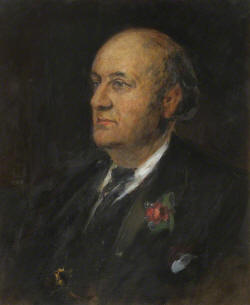

Queer Places:
Eton College, Windsor SL4 6DW, Regno Unito
University of Cambridge, 4 Mill Ln, Cambridge CB2 1RZ
 Oscar
Browning (17 January 1837 – 6 October 1923) was a British educationalist,
historian and bon viveur, a well-known Cambridge personality during the
late Victorian and Edwardian eras. An innovator in the early development of
professional training for teachers, he served as principal of the Cambridge
University Day Training College (CUDTC) from 1891 to 1909. He was part of the
Cambridge Apostles. He was also a
prolific author of popular histories and other books.
Oscar
Browning (17 January 1837 – 6 October 1923) was a British educationalist,
historian and bon viveur, a well-known Cambridge personality during the
late Victorian and Edwardian eras. An innovator in the early development of
professional training for teachers, he served as principal of the Cambridge
University Day Training College (CUDTC) from 1891 to 1909. He was part of the
Cambridge Apostles. He was also a
prolific author of popular histories and other books.
The son of a prosperous distiller, Browning was educated at Eton, and then King's College, Cambridge. On graduating in 1860 he returned to Eton as an assistant master. A vociferous and active opponent of the school's traditional curriculum and teaching methods, he introduced novel and progressive techniques to the classroom, to the general approval of his pupils but to the dismay of the Eton authorities.
In 1870, the Simeon Solomon had attended the trial of the infamous transvestites ‘Fanny and Stella’, Ernest Boulton and Frederick Park, who had been arrested one evening at the Strand Theatre for ‘personating women’. Writing to his close friend and illicit lover, Cambridge don Oscar Browning in May 1870, Solomon revealed that he had been intrigued by the newspaper coverage of the arrest and, somewhat tongue-in-cheek, supposed that they were probably ‘a most disreputable set of young men’. After both men were acquitted in March 1871, Solomon became friends with Boulton, a budding actor, and attended the Prince’s Theatre in Manchester with him later that year, with Boulton cross-dressed as his alter-ego Stella. Solomon wrote that he went to see the pantomime Bluebeard with Boulton on his arm, describing him as ‘a charming young lady’.
Browning was controversially dismissed from his post in 1876, ostensibly because of repeated disregard for school rules, but an underlying issue was disquiet arising from his lifestyle, particularly his close and affectionate relationships with boys under his care. Browning returned to King's, where he continued his individualistic approach to teaching, and rapidly established himself as a leading Cambridge personality. Again, his methods were far more popular with his students than with his colleagues. An avid social climber and self-promotionist, he cultivated a range of acquaintances in the social and political worlds – he stood unsuccessfully three times for Parliament – and published a number of books on English, European and world history. He also wrote on educational theory and produced a well-regarded biography of the writer George Eliot Despite this output, he failed to gain scholastic recognition and was repeatedly overlooked for higher college posts and academic honours. However, his pioneering work in teacher education, particularly through his leadership of the CUDTC, was later recognised as a formative factor in the development of the university's present-day Department of Education.
In 1884 Simeon Solomon was admitted to the workhouse where he continued to produce work, but his life and talent were blighted by alcoholism. In a letter to Oscar Browning, written around 1884, it is apparent that Solomon had felt some sense of contrition over his perceived ‘bad behaviour’ and his decision to remain withdrawn from respectable society. He remarks in the letter that he hoped that Browning would ‘pardon what he had done’.
After his retirement in 1909 Browning moved to Rome and remained active as a writer until his death in 1923. Among his late works were two volumes of autobiography and further historical works, including a history of Italy. At the end of his life, having earlier been denied a knightood, he was appointed an Officer of the Order of the British Empire (OBE) for his services to education.
My published books: